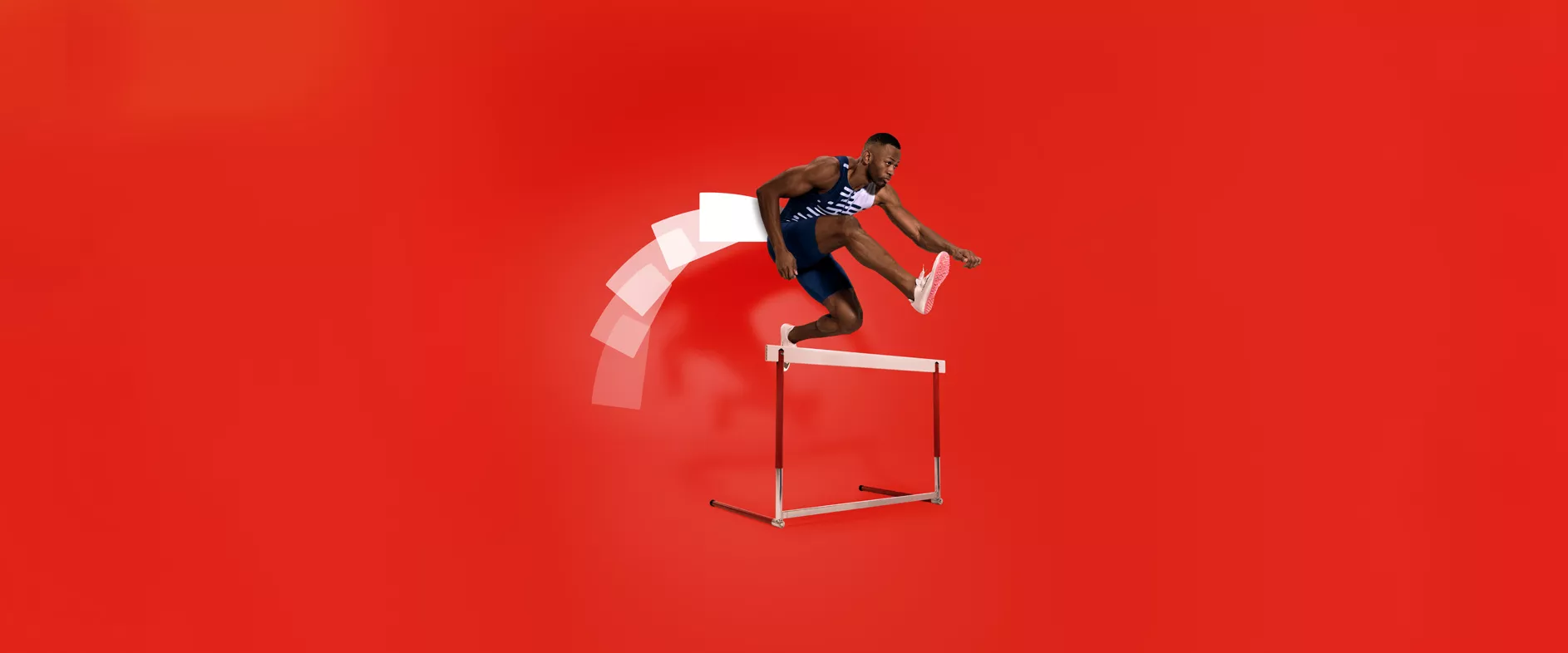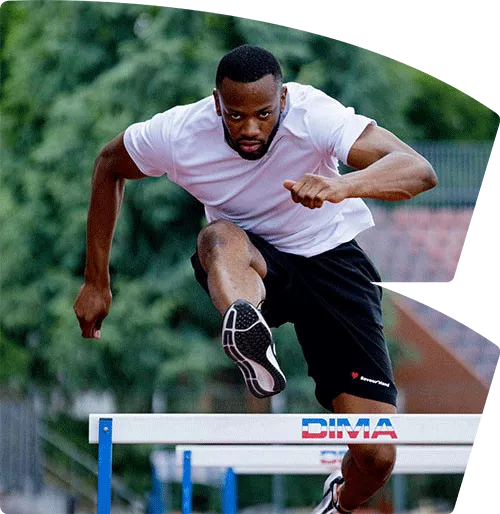
Aurel Manga
Meet Aurel Manga, French 110-meters hurdles champion and assistant project manager and telecoms works.
“Be the smartest, not necessarily the strongest”
His career
Aurel Manga grew up trash talking—exchanging taunts with his older brothers and sisters like the North American sport stars they admired. His family never missed a good NBA game, and his 2 big brothers and 2 big sisters were all accomplished athletes. As the youngest, he survived by developing a talent for repartee and tactical use of the elbow. “We always had a spirit of competition, from sports to video games,” he recalls with a smile. “And we traded jabs in English to make it more realistic.”
“I got into athletics to beat my older brother”
And there was plenty of material for the family to spar about, with one of his brothers holding the French national triple jump record in the cadet category. A high bar, and a good reason to be discouraged from the start—or an enormous source of motivation. “I got into athletics for no better reason than to beat my big brother,” Aurel says placidly.
Baby brother’s first steps
He trained at the stadium near his family’s home in Savigny-le-Temple, south of Paris, where his brothers and sisters had already joined the local club. “It’s not always easy being the youngest,” he says. “I didn’t grow as fast as they had, so I was behind them in athletics. At the beginning, the comparison was a little hard to take.” The young Aurel also played handball with a team in nearby Torcy, but made a firm commitment to athletics after he earned his baccalaureate.
Learning hurdles
Almost as soon as he reached adulthood, Aurel Manga decided to focus exclusively on 110 m hurdles. He acknowledges that his path to success wasn’t easy. “To get where I am today, I had to jump a lot of hurdles. I had to fall countless times, pick myself up, and try to convince myself that it didn’t hurt.”
From the local track to INSEP
Yet “those four intervals between hurdles put me right in my comfort zone,” he recalls. “I was hitting my stride, clocking good times, and for the first time I felt I might make it.” Others agreed: tipped as a promising young talent in French track and field, Aurel was accepted at INSEP, the National Institute of Sport, Expertise and Performance in 2012. He was 20 and the stars were aligned. But just three years later, he fell to earth.
Injuries—and a career-changing encounter
Plagued by a string of injuries, Aurel’s performance suffered. Elite sport is unforgiving, even ruthless: you need to keep racking up record times to stay in the running. And when Aurel failed to keep up, he was shown the door—a heavy blow, but one he now finds salutary. “INSEP has all the resources you need to become an Olympic champion, but—paradoxically—it doesn’t teach you how to use them,” he muses. But while he was on the sidelines, Aurel had a decisive encounter with a new coach.
International competitor
The coach had been working with some of the top French athletes in track and field, including Dimitri Bascou—now Aurel Manga’s training partner. “The first thing I told him was ‘I want to be in the running for an Olympic medal in 2020!’” recalls Aurel today. The coach responded with a high-five, and the rest is history: under his guidance, the former INSEP athlete, keen to bounce back, transitioned from national competitor to international champion.
Disappointment in Rio 2016, finals at Tokyo 2020
While Aurel qualified for the Rio Olympics in 2016, he was not selected: there were just three spots and four candidates. But instead of hanging up his cleats, he shifted his focus to indoor races—an arena where he says he felt “less pressure”. In 2018 he took home a bronze medal at the World Indoor Championships and won the silver at the European Championships. He also enrolled in engineering at the Sorbonne, all part of an upward trajectory that led him to the finals at the Tokyo Olympics in 2020.
“A podium contender in the eyes of the world”
“Being ranked among the world’s top eight in my sport was no small feat. In fact it was a huge step forward,” he recalls. At this point Aurel knew he was an Olympic medal contender in the eyes of the world—an athlete to be reckoned with at every major competition. And Paris 2024? “I can’t wait!” he says. “Believe me, I’m going to work like crazy until it’s here.”
SNCF—a welcome surprise
When Aurel Manga says “work like crazy”, he knows what he’s talking about, having earned his master’s degree in embedded electronics in 2020—a perfect credential for entering the working world. But the timing was also perfect. Just a few months earlier, French triple-jump champion Harold Correa, holder of multiple French titles and customer care agent at Transilien, had mentioned SNCF’s Athletes Programme to him. Aurel jumped at the chance and immediately made contact. “I couldn’t see waiting until the end of my athletic career to get a start in my field,” he explains. “Besides, I’ve always maintained a balance between training and work, be it at university or now at SNCF.”
A new view of SNCF Group
Aurel signed his special employment agreement with SNCF in June 2021, just before the Tokyo Olympics, and is now an assistant project manager in telecoms works at SNCF Réseau’s Telecoms and IT services unit in the Paris region. Which wasn’t an obvious choice at first. “It’s true I was more attracted to the automotive industry at the outset. In my mind SNCF was rail and only rail; I pictured your typical railway worker,” he says. “But once I’d applied, I realized just how big the company was—what a vast range of professions it had, and how many opportunities it offered.” While he readily admits he was initially more interested in the SNCF Athletes Programme than in the Group’s rail business, things are different now, he says.
Long-term vision
The warm welcome he’s received from his team at SNCF has also played a role. “I work with lots of seasoned pros here, guys who could have been abrupt or impatient with a newcomer like me,” Aurel says. “But it’s been just the opposite; they’re always friendly. They take time to explain things and we talk a lot; there are never any silences.”
Aurel Manga is all the happier in that he has every intention of moving up through the ranks as time goes by. In the meantime, this anything-but-ordinary railway worker is studying once again, focusing in particular on safety issues that he’d never been aware of. Issues that are “vitally important before taking on certain jobs.” As he says, he’s still got a lot to learn. His story at SNCF is just beginning, but he’s already enjoying every minute.
Titles and medals

Share the article

